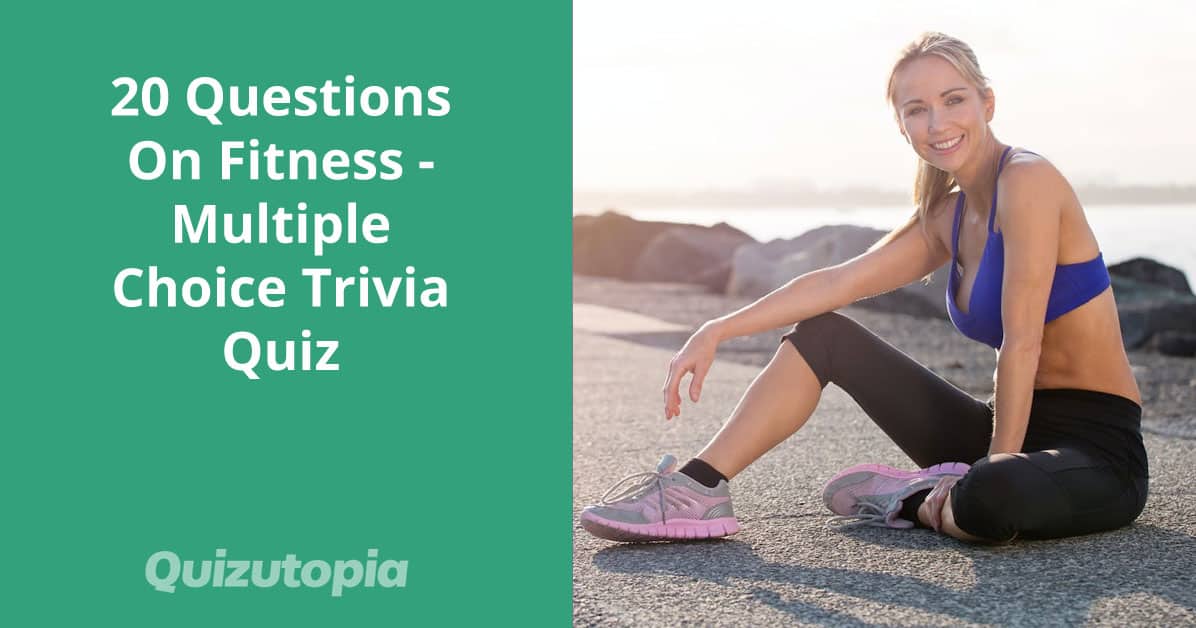Welcome to our 20 level fitness quiz, where you will test your knowledge on various aspects of fitness and wellness. This quiz is designed to challenge your understanding of the different elements that contribute to a healthy lifestyle, including nutrition, exercise, sleep, stress management, and more.
As you progress through the 20 levels, you’ll encounter questions that will require you to draw upon your knowledge of fitness concepts, scientific research, and practical tips for improving your health. Each level builds upon the previous one, so be sure to pay close attention to each question and answer carefully.
At the end of the quiz, you’ll receive a score that reflects your level of expertise in fitness and wellness. Whether you’re a beginner or an expert, this quiz is a great way to test your knowledge and learn something new about how to live a healthy, active life. So, let’s get started!

Subscribe to our mailing list to receive FREE exclusive quizzes and offers!
- What is the recommended amount of physical activity for adults per week?
- 75 minutes
- 150 minutes
- 60 minutes
- 300 minutes
The correct answer is 150 minutes.
The American Heart Association recommends at least 150 minutes of moderate-intensity aerobic activity or 75 minutes of vigorous aerobic activity per week for adults. - What type of exercise primarily focuses on increasing muscle strength and endurance?
- Cardiovascular training
- Balance training
- Resistance training
- Flexibility training
The correct answer is Resistance training.
Resistance training, also known as strength training, involves using resistance to contract muscles, which helps build strength and endurance. - Which of the following is NOT one of the three main components of a well-rounded fitness program?
- Speed training
- Resistance training
- Cardiovascular training
- Flexibility training
The correct answer is Speed training.
A well-rounded fitness program typically includes cardiovascular training, resistance training, and flexibility training. - What is the primary energy source used during high-intensity exercise?
- Proteins
- Fats
- Carbohydrates
- Oxygen
The correct answer is Carbohydrates.
Carbohydrates are the body’s preferred energy source during high-intensity exercise because they can be quickly broken down into glucose to provide energy.
- Which of the following exercises is an example of a compound movement?
- Bicep curl
- Tricep extension
- Squat
- Calf raise
The correct answer is Squat.
Compound movements, like the squat, work multiple muscle groups and joints at the same time, providing a more efficient and functional workout. - Which of the following is NOT a benefit of regular exercise?
- Improved mental health
- Improved sleep quality
- Increased risk of injury
- Increased energy levels
The correct answer is Increased risk of injury.
Regular exercise can actually decrease the risk of injury by improving muscle strength, balance, and coordination. - What is the primary purpose of a warm-up before exercising?
- Burn calories
- Increase flexibility
- Build muscle
- Increase blood flow to muscles
The correct answer is Increase blood flow to muscles.
Warming up helps prepare the body for exercise by increasing blood flow to the muscles, raising body temperature, and improving joint mobility. - Which of the following is NOT a type of stretching?
- Static stretching
- Dynamic stretching
- Isometric stretching
- Ballistic stretching
The correct answer is Isometric stretching.
Isometric stretching involves contracting a muscle without changing its length, which is not a type of stretching. - What is the recommended amount of sleep for adults to support optimal health and fitness?
- 8-10 hours
- 7-9 hours
- 5-7 hours
- 6-8 hours
The correct answer is 7-9 hours.
The National Sleep Foundation recommends that adults get 7-9 hours of sleep per night to support optimal health and fitness. - What is the term used to describe a temporary decrease in exercise performance due to overtraining?
- Adapting
- Overloading
- Plateauing
- Overreaching
The correct answer is Overreaching.
Overreaching is a short-term decrease in exercise performance caused by excessive training without adequate recovery.
- Which of the following is an example of an aerobic exercise?
- Weightlifting
- Pilates
- Running
- Yoga
The correct answer is Running.
Aerobic exercises, like running, involve continuous movement that increases heart rate and breathing, improving cardiovascular endurance. - What is the principle of progressive overload?
- Varying the type of exercise performed
- Gradually increasing the stress placed on the body during exercise
- Exercising at the same intensity for an extended period of time
- Decreasing the stress placed on the body during exercise
The correct answer is Gradually increasing the stress placed on the body during exercise.
Progressive overload is the principle of gradually increasing the stress placed on the body during exercise, which allows the body to adapt and improve its performance. - Which of the following is NOT a macronutrient?
- Fats
- Proteins
- Carbohydrates
- Vitamins
The correct answer is Vitamins.
Vitamins are micronutrients, while carbohydrates, proteins, and fats are macronutrients that provide the body with energy. - What is the recommended daily protein intake for most adults to support muscle growth and maintenance?
- 1.2 grams per kilogram of body weight
- 0.8 grams per kilogram of body weight
- 2.0 grams per kilogram of body weight
- 1.6 grams per kilogram of body weight
The correct answer is 0.8 grams per kilogram of body weight.
The Recommended Dietary Allowance (RDA) for protein is 0.8 grams per kilogram of body weight for most adults.
- Which of the following exercises primarily targets the muscles in the chest?
- Pull-up
- Deadlift
- Leg press
- Bench press
The correct answer is Bench press.
The bench press is a compound exercise that primarily targets the muscles in the chest, along with the shoulders and triceps. - What is the primary role of carbohydrates in the body?
- Regulate hormones
- Support immune function
- Build and repair muscle tissue
- Provide energy
The correct answer is Provide energy.
Carbohydrates are the body’s primary source of energy, as they are broken down into glucose and used for various functions. - What is the recommended frequency of resistance training for each major muscle group?
- 3-4 times per week
- 2-3 times per week
- 5-6 times per week
- 4-5 times per week
The correct answer is 2-3 times per week.
The American College of Sports Medicine recommends resistance training each major muscle group 2-3 times per week, with at least 48 hours of rest between sessions. - Which of the following is NOT a benefit of flexibility training?
- Improved posture
- Enhanced range of motion
- Reduced risk of injury
- Increased muscle growth
The correct answer is Increased muscle growth.
Flexibility training primarily focuses on improving range of motion and reducing the risk of injury, rather than increasing muscle growth. - What is the term used to describe the maximum amount of oxygen an individual can utilize during intense exercise?
- VO2 max
- Aerobic capacity
- Cardiovascular endurance
- Anaerobic threshold
The correct answer is VO2 max.
VO2 max is a measure of an individual’s aerobic fitness, representing the maximum amount of oxygen they can utilize during intense exercise.
- Which of the following is an example of a bodyweight exercise?
- Dumbbell curl
- Leg press
- Push-up
- Barbell squat
The correct answer is Push-up.
Bodyweight exercises, like push-ups, use the individual’s own body weight as resistance, requiring no additional equipment.









